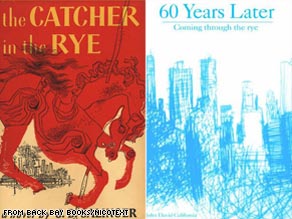
Lawyers for the author of "Catcher in the Rye" call "60 Years Later: Coming Through the Rye" a rip-off.
Lawyers for Salinger filed suit in federal court this week to stop the publication, sale and advertisement of "60 Years Later: Coming Through the Rye," a novel written by an author calling himself J.D. California and published by a Swedish company that advertises joke books and a "sexual dictionary" on its Web site.
"The Sequel infringes Salinger's copyright rights in both his novel and the character Holden Caulfield, who is the narrator and essence of that novel," said the suit, filed Monday in U.S. District Court in New York.
full story at http://www.cnn.com/2009/SHOWBIZ/books/06/03/salinger.catcher.lawsuit/index.html?iref=allsearch
I went and researched a little bit more into this subject, and on many of the web pages there are equally hot and cold comments left bypeople saying that since its an entirely new story with similarities to "Catcher", there should be no reason why a federal judge would rule to ban the US publication of the book since, according to some, it is merely a derrivative work. For others, for example a blogger on another website who was responding to a different article on the same subject, said people think "that only verbatim copying can constitute "copying" for purposes of an infringement/fair use analysis. This is simply not the case. There are two forms of similarity that are relevant - "fragmented literal similarity" (actual copying) and "comprehensive non-literal similarity." If you take enough of another person's work, even if it isn't literal expression, it can rise to the level of actionable copying." This is not to say that any work cannot be influenced by another work, however respectable dues have to be credited for an author's original work. And while there are certain people who would say that Mr. California doesn't copy word for word Mr. Salinger's work, it does seem he wants to exploit the value of Holden Caulfield by Salinger and has not been sufficiently transformative of his story to claim fair use.
My favorite response concerning copyright law was from some guy who wrote:
"There goes my trilogy book deal, Duke of the Bracelets, about Freddo Baggets' journey to destroy his "one bracelet to govern them all", on the Isle of Martyr where the silhouttes lie."
2 comments:
I think this possibly falls into the same realm or style of writing as "Pride and Prejudice and Zombies", or whatever the book mentioned in class was. I also think that while I hated "The Catcher in the Rye", this new book sounds like a transformative work that I would be interested in reading. I like anyone else would have to read the new book in it's entirety to know whether it is a rip-off. The Main thing that tells me it is a transformative work is that the main character is 60 years older and thus possibly has a different viewpoint regarding people and life, hopefully a more positive one.
The other book I forgot the name of in class was "Sense and Sensibility and Sea Monsters"
Post a Comment